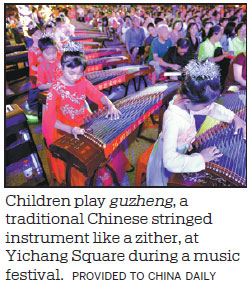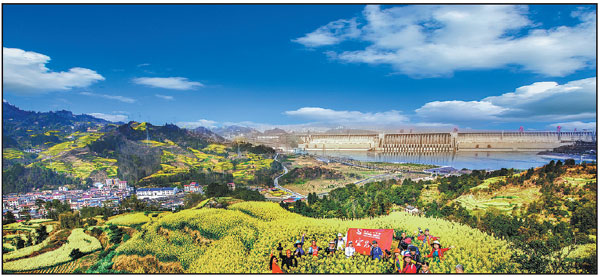Pleasing the crowd a vital method to get urban and rural trades booming
The link between tourism and sectors such as culture, agriculture and sports has nurtured new growth opportunities to boost business in Yichang.
Official figures show that the city in Central China's Hubei province received about 50 million visits in the first half of 2019, up 12.8 percent from a year before. Tourism revenue recorded a year-on-year increase of roughly 13 percent to 51.39 billion yuan ($7.22 billion).
As a city with a history of more than 2,000 years, Yichang has developed a couple of tourism parks that center on China's ancient celebrities such as Qu Yuan, a great poet during the Warring States Period (475-221 BC) and Wang Zhaojun, one of most famous beauties in ancient China, who lived in the Western Han Dynasty (206 BC-AD 24).
In Qu's home of Zigui county, a group of museums, theaters, galleries for intangible cultural heritage and traditional opera houses were constructed with millions of yuan in investment. Collectively, they have narrated the life story of the poet, performed his poems and staged related dramas and operas.
Wang was famous for marrying the chief of the Xiongnu people, a nomadic tribal group in northern China, who was in conflict with the Han Empire at that time. Her marriage, ordered by the Han emperor, brought peace to her country.

The authorities in Yichang have designed a rail tourism route, connecting her hometown in Xingshan county to Hohhot in North China's Inner Mongolia autonomous region, where the Xiongnu chief was once settled. The route is coupled with many activities, including music festivals and dining experiences.
Besides rich cultural resources, Yichang has also turned villages into tourism sites with diversified agricultural products, such as peaches, tea, vegetables, flowers and oranges.
Xilingxia village, a well-known peach production center, receives more than 150,000 visits a year. Tourists come to pick and eat peaches and bring more than 30 million yuan in tourism revenue annually, according to local statistics.
By the end of 2018, a total of 62 villages under the administration of Yichang had used tourism to alleviate poverty. In the villages, rural tourism has created about 138,000 jobs and helped 20,000 people escape poverty, official figures showed.
The city also combines sports events with tourism. It has held a series of competitions, including a road cycling race, marathon, cross-country car race and mountaineering competition, as well as the 2019 China Natural Waters International Extreme Drifting F1 Grand Prix in June.
chenhong@chinadaily.com.cn
|
Photographers seek inspiration amid rape blossom in Yichang. Han Bing / For China Daily |
(China Daily 09/28/2019 page14)















